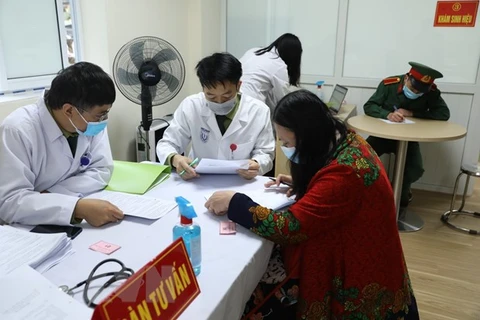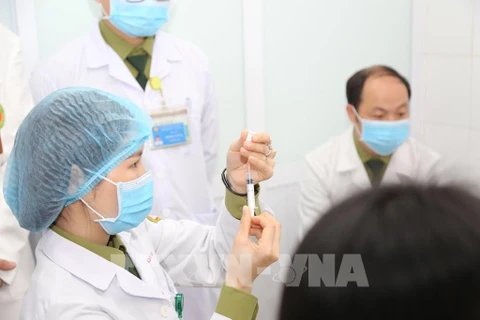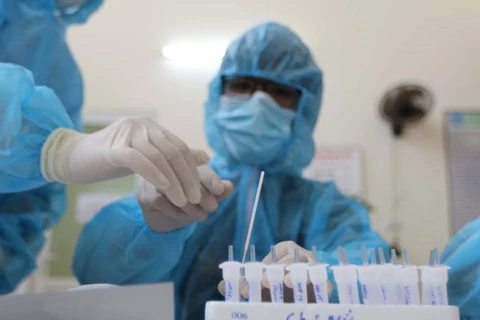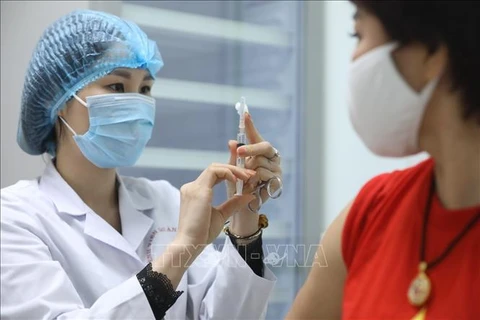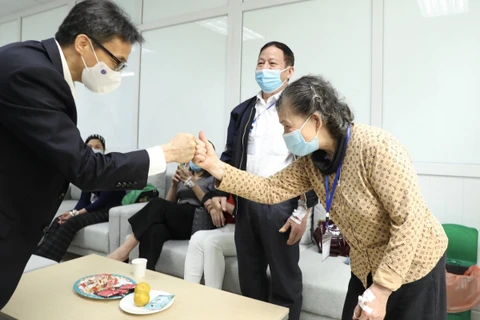 Deputy Prime Minister Vu Duc Dam receives Nano Covax, Vietnam's own COVID-19 vaccine, on March 26 as part of the vaccine's second phase human trials. (Photo: vov.vn)
Deputy Prime Minister Vu Duc Dam receives Nano Covax, Vietnam's own COVID-19 vaccine, on March 26 as part of the vaccine's second phase human trials. (Photo: vov.vn) Dam, 58, is the head of the National Steering Committee for COVID-19 Prevention and Control, and Tac a science official. They both underwent medical check-ups before receiving the shot at the Vietnam Military Medical University in Hanoi.
After the inoculations, Dam and Tac remained at the injection room for follow-up observation for 30 minutes, before he visited and thanked volunteers who were at the university for the second jab in the trials during March 25-April 6, as well as giving words of encouragement to the vaccine developers.
The volunteers were given the first jab between February 26 and March 9.
Nano Covax, developed by HCM City-based biopharmaceutical company Nanogen, was the first vaccine made by Vietnamese scientists to enter clinical trials.
Dam expressed his pride and confidence in the scientists of Vietnam, adding that in the future, the public will be able to receive the COVID-19 vaccine shots for free in the framework of the National Expanded Programme on Immunisation.
He stressed that all agencies and people involved in the research and development of locally made vaccines must expedite the progress, but no corners should be cut.
Professor Do Quyet, Director of Military Medical University, said the results of the first phase trial showed Nano Covax is safe and enabling the body to generate antibodies that can neutralise coronavirus, including the highly contagious variant first reported in the UK (B117).
The second phase involves a larger number of volunteers (560 people between 18-60 years old including people with some mild or early-stage chronic conditions) and the focus shifts to the effectiveness and immunogenicity of the vaccine, according to Quyet.
The volunteers are divided into four groups, 80 are injected with a placebo, and the rest are given different doses – 25mcg, 50mcg, and 75mcg to test dosage level.
After the end of the trials, the people given the placebo will be injected with the real vaccines.
With the current progress, by the end of June-early July this year, scientists can propose to the national committee for ethics in biomedical research to allow commence of phase 3 trials and greenlight experimental injections on a wider scale, he continued.
According to the expert, WHO noted that the vaccine should be evaluated on whether it could provide protection for the people in an environment with community infections.
In the phase 3 trials, scientists will need to test the vaccine on 10,000 people – 5,000 people to receive Oxford/AstraZeneca COVID-19 vaccines, and 5,000 to receive Nano Covax shots – to compare the two vaccines’ side effects, immunogenicity and the ability to fight the virus.
With this approach, Quyet believes that by September this year, Vietnam could have its first commercial COVID-19 vaccine./.
VNA
